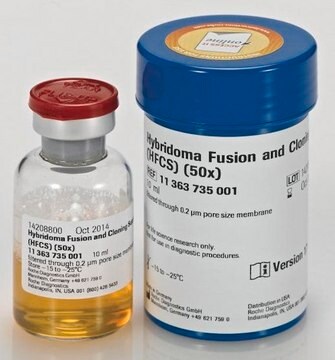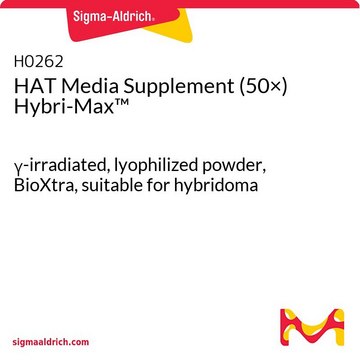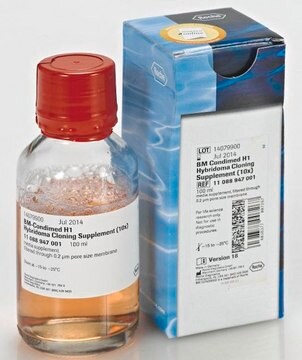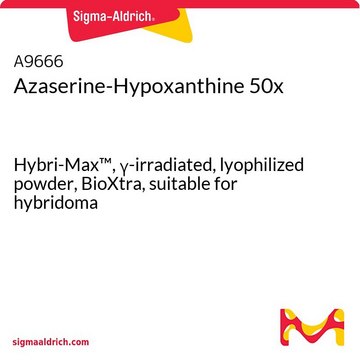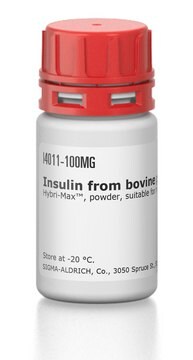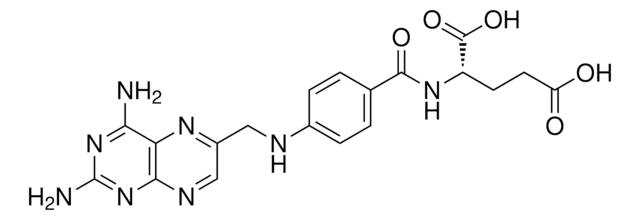O5003
OPI Media Supplement
Hybri-Max™, γ-irradiated, powder, suitable for hybridoma
Synonym(s):
OPI Media for cell culture
Sign Into View Organizational & Contract Pricing
All Photos(1)
About This Item
UNSPSC Code:
12352207
NACRES:
NA.75
Recommended Products
grade
Hybri-Max™
Quality Level
sterility
γ-irradiated
form
powder
concentration
18-40 mg/vial
technique(s)
cell culture | hybridoma: suitable
impurities
endotoxin, tested
storage temp.
−20°C
Application
OPI Media Supplement has been used to grow hybridoma cell lines from XenoMouse strains and BALB/c female mice.
Other Notes
Formulated with: 0.15 g oxaloacetate, 0.05 g pyruvate, and 0.0082 g insulin.
Reconstitution
Reconstitute contents of vial with 10 mL sterile water. Do not use cell culture medium for initial reconstitution. Each vial sufficient to prepare 1 liter of medium. Final working concentration: 1 mM oxaloacetate, 0.45 mM pyruvate, 0.2 U/ml insulin.
Legal Information
Hybri-Max is a trademark of Sigma-Aldrich Co. LLC
Signal Word
Danger
Hazard Statements
Precautionary Statements
Hazard Classifications
Eye Dam. 1 - Skin Corr. 1 - Skin Sens. 1
Storage Class Code
8A - Combustible corrosive hazardous materials
WGK
WGK 1
Flash Point(F)
Not applicable
Flash Point(C)
Not applicable
Choose from one of the most recent versions:
Already Own This Product?
Find documentation for the products that you have recently purchased in the Document Library.
Customers Also Viewed
Andrew W Drake et al.
Analytical biochemistry, 328(1), 35-43 (2004-04-15)
Two biophysical methods, Biacore and KinExA, were used to kinetically and thermodynamically characterize high-affinity antigen/antibody complexes. Three to five independent experiments were performed on each platform with three different antigen/antibody complexes possessing nanomolar to picomolar equilibrium dissociation constants. By monitoring
Tzu-Ling Sung et al.
PLoS pathogens, 5(1), e1000263-e1000263 (2009-01-17)
Cyclin T1 is a regulatory subunit of a general RNA polymerase II elongation factor known as P-TEFb. Cyclin T1 is also required for Tat transactivation of HIV-1 LTR-directed gene expression. Translation of Cyclin T1 mRNA has been shown to be
Megan E Bosch et al.
Journal of neurochemistry, 148(5), 612-624 (2018-07-03)
Juvenile neuronal ceroid lipofuscinosis (JNCL) is a lysosomal storage disease caused by autosomal recessive mutations in ceroid lipofuscinosis 3 (CLN3). Children with JNCL experience progressive visual, cognitive, and motor deterioration with a decreased life expectancy (late teens-early 20s). Neuronal loss
Our team of scientists has experience in all areas of research including Life Science, Material Science, Chemical Synthesis, Chromatography, Analytical and many others.
Contact Technical Service
